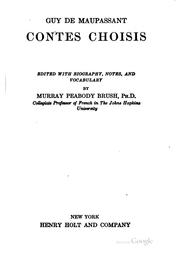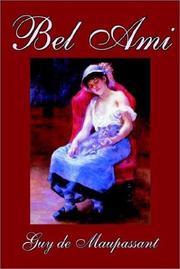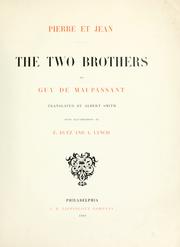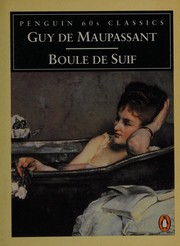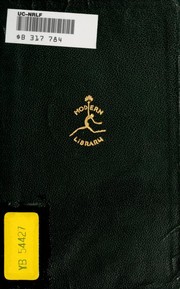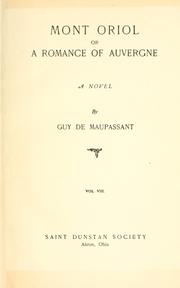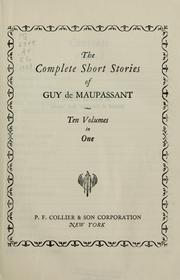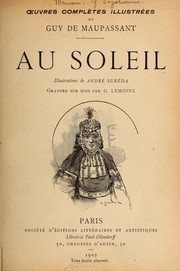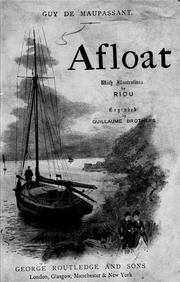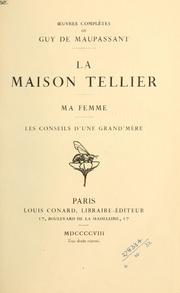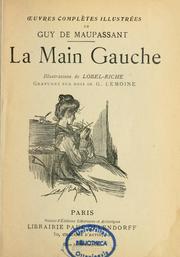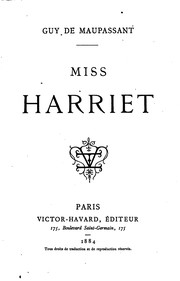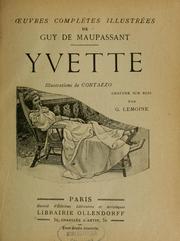Guy de Maupassant, né le 5 août 1850 au château de Miromesnil près de Tourville-sur-Arques (France) et mort le 6 juillet 1893 dans le 16e arrondissement de Paris, est un écrivain et journaliste littéraire français. Lié à Gustave Flaubert et à Émile Zola, Maupassant a marqué la littérature française par ses six romans, dont Une vie en 1883, Bel-Ami en 1885, Pierre et Jean en 1887-1888, et surtout par ses nouvelles (parfois intitulées contes) comme Boule de Suif en 1880, les Contes de la bécasse (1883) ou Le Horla (1887). Ces œuvres retiennent l’attention par leur force réaliste, la présence importante du fantastique et par le pessimisme qui s’en dégage le plus souvent, mais aussi par la maîtrise stylistique. La carrière littéraire de Maupassant se limite à une décennie — de 1880 à 1890 — avant qu’il ne sombre peu à peu dans la folie et ne meure peu avant l'âge de 43 ans. Reconnu de son vivant, il conserve un renom de premier plan, renouvelé encore par les nombreuses adaptations cinématographiques de ses œuvres.
(Henry René Albert) Guy De Maupassant is generally considered to be the greatest French writer of short stories. One account says the location of his birth was the Château de Miromesnil, in Dieppe, though this is not certain. His paternal ancestors were of the minor aristocracy, and his maternal grandfather, Paul Le Poittevin, was Gustave Flaubert's godfather. His parents separated when he was 11 years old.
Maupassant was gifted with a photographic memory, which aided him in recollecting events and characters for his stories. As a teenager, Maupassant was shown, by the poet Algernon Swinburne (1837-1909), a mummified hand. He used this haunting image in his early short story La Main Ecorchée (1875). In 1869 Maupassant started to study law in Paris, but soon, at age 20, he volunteered to serve in the army during Franco-Prussian War. After his return to Paris, Maupassant joined the literary circle of Gustave Flaubert, who introduced him to some of the leading writers of his day, including Emile Zola, Ivan Turgenev, and Henry James. Flaubert saw Maupassant regularly and schooled him in the craft of being a writer.
From 1872 to 1880, Maupassant worked as a civil servant, first at the ministry of maritime affairs, then at the ministry of education. Toward the end of this time, Maupassant published his first poetry, Des Vers (1880). Later the same year he published his short story masterpiece, "Boule de Suif" (Ball of Fat) in the anthology Soirées de Medan (1880), edited by Emile Zola. The story, set during the Franco-Prussian War, is about passengers on a coach, one of whom is a well-known prostitute, nicknamed 'Boule de Suif.' The story later inspired director John Ford's Western film Stagecoach (1945).
During the 1880s Maupassant created some 300 short stories, six novels, three travel books, and one volume of verse. In tone, his tales were marked by precision of style and a range of expression. Although his stories range from moving drama to sometimes bizarre comedy, it is his macabre horror stories that have received much attention.
Among Maupassant's best known books is Une Vie (A Woman's Life, 1883), about the frustrating existence of a Norman wife, Bel-Ami (1885), which depicts an unscrupulous journalist. Pierre et Jean (1888) was a psychological study of two brothers. The novel was thought to be immoral, according to the classic definition, because the hero succeeds by doing wrong. Maupassant's most upsetting horror story, "Le Horla" (1887) (not to be confused with another of Maupassant's stories called "The Trip of Le Horla", which is about a hot air balloon), was about vampire-like ghouls, madness and suicide.
Maupassant had suffered from syphilis since his 20's, which caused him neurological and mental problem in his later years, and which undoubtedly accounts for his shortened lifespan. Some critics have alleged that Maupassant's developing illness can be seen through a growing preocuppation with mental illness in his stories. However, the theme of mental illness is present even in his first collection, La Maison Tellier (1881), published at the height of his health. Maupassant's horror fiction consists of some 39 stories, only a tenth of his total work. A recurring theme in these is madness: "A Queer Night in Paris" is a paranoid nightmare: its narrator feels compelled to walk the streets. In "Who Knows?" the subject suffers from delusions about the furniture in his house. "Diary of a Madman" is a story about a judge, who commits murder, just for the experience, and condemns an innocent man to death for the crime. "The Inn" has many similarities with Stephen King's novel The Shining. His story, "The Hand," based on his teenage recollection, has inspired later authors and movie directors. Maupassant's writing is sometimes compared with that of Edgar Allen Poe.
On January 2, 1892, Maupassant tried to commit suicide by cutting his throat and was committed to the celebrated private asylum of Dr. Esprit Blanche at Passy, in Paris, where he died next year. Maupassant's style has been imitated by countless writers, and his influence can be seen on such masters of the short story as W. Somerset Maugham and O. Henry.
2439 works Add another?
![]() Sorted by:
Most Editions
|
First Published
|
Most Recent
|
Top Rated
|
Reading Log
|
Random
Sorted by:
Most Editions
|
First Published
|
Most Recent
|
Top Rated
|
Reading Log
|
Random
Showing all works by author. Would you like to see only ebooks?
Subjects
Fiction, Translations into English, Continental european fiction (fictional works by one author), Social life and customs, French language, Fiction, short stories (single author), Children's fiction, Short stories, Classic Literature, French Short stories, Horror tales, Fiction, general, Criticism and interpretation, Horror stories, short stories, short story, American Horror tales, American literature, History, Readers, Description and travel, French Authors, French fiction, horror, Manners and customsPlaces
France, Italy, London, United States, Paris, Alabama, Owl Creek Bridge, Sicily (Italy), Toledo, Baker Street, England, Algeria, Amazon rainforest, Caribbean, Jefferson, Mallard residence, Massachusetts, Mediterranean Region, New England, Paris (France), Ship-Trap Island, Sicily, Tibet, Verona, DublinPeople
Guy de Maupassant (1850-1893), John H. Watson, Sherlock Holmes, Father Time, Peyton Farquhar, Archie, Duncan Ross, Gustave Flaubert (1821-1880), Jabez Wilson, John Clay, Mr. Merryweather, Police Inspector Jones, Vincent Spaulding, William Shakespeare (1564-1616), Abram, Balthasar, Benvolio, Brently Mallard, Devil, Escalus, Friar John, Friar Lawrence, General Zaroff, Goodman Brown, GregoryTime
19th century, 20th century, 1890, Antebellum era, 1861-1865, 1861-65, 19e siècle, 1600s, 1870-1940, 19th Century, American Civil War, Civil War, Franco-Prussian war, 1692, 17th century, 1889, 1935-1947, 1940, 1941, 1942, 1944, 1947, Carnival, Colonial period, FaguoID Numbers
- OLID: OL29388A
- Amazon ID: B000APUZXC
- GoodReads: 18791
- ISNI: 0000000121258201
- LibraryThing: maupassantguyde
- LibriVox: 436
- Project Gutenberg: 306
- VIAF: 29537765
- Wikidata: Q9327
- Inventaire.io: wd:Q9327
Links (outside Open Library)
Alternative names
- Guy De Maupassant
- Maupassant
- Guy de MAUPASSANT
- de Guy Maupassant
- Guy Maupassant
- De Guy Maupassant
- Henri Rene Guy de Maupassant
- Guy De, Maupassant
- Henri Rene Guy De Maupassant
- Guy De Manupassant
- Guy de, Maupassant
- Guy, de Maupassant
- de Maupassant Guy
- Maupassant, Guy de, 1850-1893.
- GUY DE MAUPASSANT
- MAUPASSANT, GUY DE, 1850-1893.
- Henri René Albert Guy de Maupassant
- Guy de Manupassant
- Guy de Maupassant, Albert M. C. McMaster, A. E. Henderson, Mme. Quesada
- G. Maupassant
- Guyde Maupassant
- MAUPASSANT G
- De Maupassant
- Maupassant G.
- G De Maupassant
- Maupassant,Guy De モーパッサン,ギ・ド (1850-1893)
- Guy De Maupassant(1850-1893)
- Maupassant,Guy De Maupassant(1850-1893)
- Maupassant Guy de
- Guy de, Maupassant,
- guy de maupassant
- Ги де Мопассан
- GUY MAUPASSANT (DE)
- Guy Maupassant de
- DE MAUPASSANT G
- Guy de 1850-1893 Maupassant
- Guy De 1850-1893 Maupassant
- Guy Maupassant (de)
- Guy de Maupassant
- DE MAUPASSANT-G
- René Albert Guy De Maupassant
- Guy de Guy de Maupassant
- Guy de "Maupassant "
- G. U. Y. DE MAUPASSANT
- Maupassant Guy De
- De Maupassant. Guy.
- MAUPASSANT
- Albert Guy de Maupassant
- De, Maupassant, Guy
- Guy (edited by Saxe Commins) de Maupassant
- guy de MAUPASSANT
- DE MAUPASSANT,GUY
- Guy (edited By Saxe commins) de Maupassant
- guy maupassant
- DE MAUPASSANT Guy
- Guy de (1850-1893) Maupassant
- de maupassant
- G MAUPASSANT
- MAUPASSANT,G
- DE MAUPASSANT
- DE MAUPASSANT GUY
- De Maupassant G
- MAUPASSANT,GUY DE
- Guy de Maupassant,G. De Maupassant
- G. de Maupassant
- De Maupassant. Guy
- GUY Translated By Donald Adamson DE MAUPASSANT
- Maupassant, Guy De (1850-1893). Lambourne, Nigel (Illus.)
- Maupassant (de)
- G D Maupassant
- Guy DE MAUPASSANT
- G. D Maupassant
- G. De Maupassant
- De Maupassant (Guy)
- De Maupassant Guy
- Guy De (1850 - 1893) Maupassant
- G. U. Y. De MAUPASSANT
- G Maupassant
- Guy Du Maupassant
- Maupassant Maupassant
- De Maupassant guy
- G de Maupassant
- Guy de Maupassant
| March 13, 2024 | Edited by mheiman | merge authors |
| March 7, 2024 | Edited by bitnapper | merge authors |
| March 7, 2024 | Edited by bitnapper | merge authors |
| March 7, 2024 | Edited by bitnapper | merge authors |
| April 1, 2008 | Created by an anonymous user | initial import |



